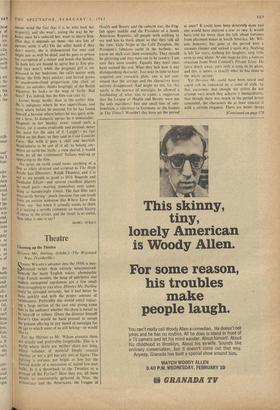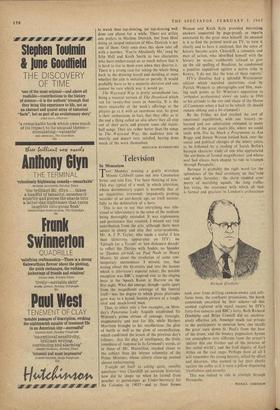Theatre
Cleaning up the Thirties
bit.orce Me. Darling. (Globe.)-- The Wayward Way. (Vaudeville.)
ANDY Wit.SON's advance into the 1930s is mis- directed rather than entirely misconceived. Beneath the nasty English voices abominable stage French accents, the heap of sub-lyrics and endless uninspired tap-dances are a few small ideas struggling to stay alive. Divorce Me, Darling could be salvaged certainly, but it had better be done quickly and with the proper amount of ruthlessness. Preferably this would entail replac- trig a large section of the cast and giving some hint to the audience whether the show is meant to be take-off or tribute. (Does the director himself know?) One would be hard pressed to accept the present offering in any mood of nostalgia for an age to which some of us still belong—or would like to.
For the Thirties as Mr. Wilson presents them are strictly and preferably forgettable. This is a World where skirts are neither short nor long, Where volumes of material limply conceal Whether or not a girl has any sort of figure. The lighting is curious, not bright or low but the 'united dazzle of a succession of naked low-watt bulbs. Is it a throwback to the Twenties or a Presage of the Forties? Here they are, all these People so conveniently gathered in Nice, the aristocracy and the Americans, the League of Health and Beauty and the cabaret star, the Eng- lish upper middle and the President of a South American Republic, all people with nothing to say and less to think about so that they talk all the time. Gala Night at the Café Pataplon, the President's fabulous yacht in the harbour, we know we shall visit them eventually. They should be glittering and they turn out to be tawdry. I am sure they were tawdry. Equally they must once have seemed the end. What they lack now is any distinguishing character. Too near in time to have acquired any romantic glow, one is not con- vinced that the settings and the characters have entirely disappeared. And might we not. for this surely is the essence of nostalgia, be allowed a foreboding of what was to come. a suggestion that the League of Health and Beauty were not the only marchers'? Just one small hint of anti- Semitism. a reference to Germany or the leaders in The Times? Wouldn't this have set the period at once? It could have been delicately done and one would have enjoyed a tear or two. It would have told far more than the talk about fortunes from platinum mines in South America. Mr. Wil- son, however, has gone at the period with a vacuum cleaner and sucked it quite dry. Nothing is left for tears, nothing for laughter, very little even to sing about. At one stage he lifts a famous situation from Noel Coward's Private Lives. He takes much away. puts only a song in its place, and this. it seems. is exactly what he has done to the whole period.
Yet Divorce Me could have been saved and could still be redeemed by a sense of style, by that awareness that though the artists do not attempt very much they achieve it immaculately, that though there was much in the period better concealed, the characters do at least conceal it with a certain elegance. There are better things [Continued on page 170 to watch than tap-dancing, yet tap-dancing well done can please for a while. There are artists one prefers to Marlene Dietrich, but Joan Heal doing an insipid imitation of Miss Dietrich is not one of them. Only once does this show take off with a number, 'You're Absolutely Me,' sung by Irlin Hall and Keith Smith as two characters who have embarrassed us so much before that it is hard to rise to them even when they deserve it. There is a strong case for taking the whole thing back to the drawing board and deciding at once whether the aim is imitation or parody. It would probably have to be a majority decision and one cannot be sure which way it would go.
The Wayward Way is pretty secondhand too, being a musical version of The Drunkard which ran for twenty-five years in America. It is the more enjoyable of the week's offerings as the players go at it with an enormous zest. So great is their enthusiasm, in fact, that they offer us at the end a thing called an olio where they all step out of their parts and present some old music- hall songs. They are rather better than the songs in The Wayward Way, the audience join in merrily and depart very satisfied, having done much of the work themselves.
MALCOLM RUTHERFORD



































 Previous page
Previous page